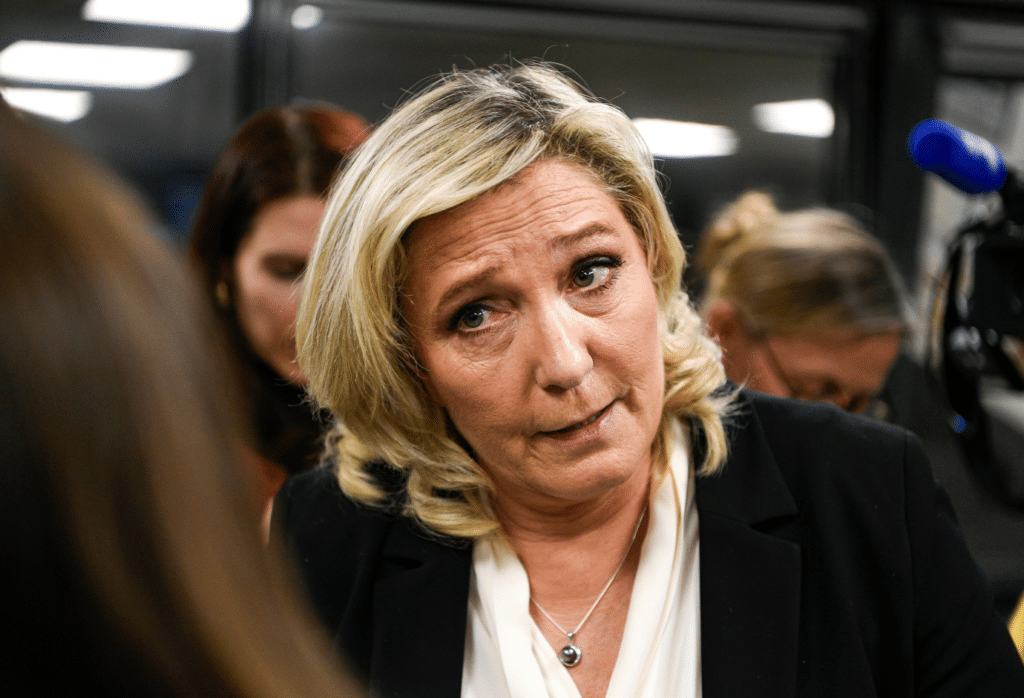Far right governments have been steadily gaining power across European countries over the past few years. On Sunday, France became its latest victim after the National Rally party came out as clear victor in the first round of the snap parliamentary elections scheduled by President Emmanuel Macron.
The National Rally (formerly National Front, created by Jean-Marie Le Pen) is led by Le Pen’s daughter, Marine. Her party beat out Jean-Luc Melenchon’s newly created far-left party New Popular Front, securing 34 per cent of voters. Meanwhile, President Macron’s centrist Renaissance party took just over a fifth of the total votes. Exit polls projections currently show that Le Pen’s National Rally is likely to reach absolute majority.
All three parties will go through to the second round of voting when the final make-up of France’s next National Assembly will be determined.
On Sunday, Marine Le Pen continued to urge her voters to hand it an commanding legislative majority of seats in the National Assembly, adding that they had “almost wiped out” president Macron’s party during the first round.
“The French people have shown without ambiguity their willingness to turn the page after seven years of corrosive power,” Marine Le Pen said. “However, nothing is won. The second round will be decisive.”
If her party succeeds in the next round of voting, her protege, 28-year-old Jordan Bardella, would become prime minister.
All eyes are now on the second round of elections, taking place this Sunday. If the National Rally emerges with an overall majority, President Macron would be forced into a “cohabitation”, where he would be working alongside a prime minister from an opposing party — namely, Jordan Bardella.
Who is Marine Le Pen?
Marine is the youngest daughter of Jean-Marie Le Pen, the former leader of the National Front. She studied law at university and worked as a lawyer for several years before stepping into politics.
In 2015, Marine expelled her father from the party, citing his racist and anti-Semitic opinions and his repeated view that the Holocaust was “a detail of history.”
Upon reflection, Le Pen said that she’d asked herself at the time: “Did you really do this? Because it seemed so insane. But we had no choice. It was either that or the movement would disappear.”
Marnie took over as leader in 2011 and claimed that her father, who had been found guilty on multiple charges of inciting racial hatred, should “no longer be able to speak in the name of the National Front”.
In a bid to separate herself from her father’s legacy, she changed the name of her party in 2018 from the historical “National Front” to “National Rally.” Earlier this year, Le Pen told reporters at a press conference that any mention of her father’s historical actions when discussing her own agenda was “inelegant.”
“It has been years that we frequent our fellow lawmakers in a fruitful and respectful fashion,” she said. “Those who insist on continuing to refer to us as the National Front are proving that they don’t have much to say about us.”
She has thrice run for president — once in 2012, when she placed third; in 2017, when she lost to Macron in the second round of voting; and in 2022, when she was beaten by Macron.
Over the years, she has made several racist remarks against minority groups, especially against Muslims. In 2010, she was ordered to stand trial on charges of inciting racial hatred after she compared Muslims praying in the streets to the Nazi occupation of France in World War Two. She was subsequently acquitted on the charges.
In 2014, she called for a ban on French citizens holding double nationality, saying “they must choose: they are Algerian or French, Moroccan or French, they can’t be both”.
“This is the demonstration of the total failure of immigration policy in our country, of the refusal to assimilate by a certain number of binationals,” she said when police and football fans clashed after Algeria’s win over Russia in a World Cup match.
She has made strong links between immigration and militant Islamism, proposing in 2015 to “annihilate” Islamist radicals and regain control of its border the day after 130 people were killed in multiple terrorist attacks in Paris.
“Urgent action is needed,” Le Pen told reporters in November 2015. “Islamist fundamentalism must be annihilated, France must ban Islamist organisations, close radical mosques and expel foreigners who preach hatred in our country as well as illegal migrants who have nothing to do here.”
A year later, she appeared on BBC’s The Andrew Marr show, when she asked the host: “Do we want a multicultural society following the model of the English-speaking world where fundamental Islam is progressing … or do we want an independent nation with people able to control their own destiny?”
In 2022, she said she was “absolutely opposed to wearing the veil everywhere.”
“It is a marker of an ideology that I intend to fight with the greatest virulence, Islamism,” she said. “I believe it to be as dangerous as Nazism.”
As a woman, she hasn’t spoken out against gender-based violence or promoted equal rights in the workforce. Her polices ignore the inequities women continue to face throughout society.


